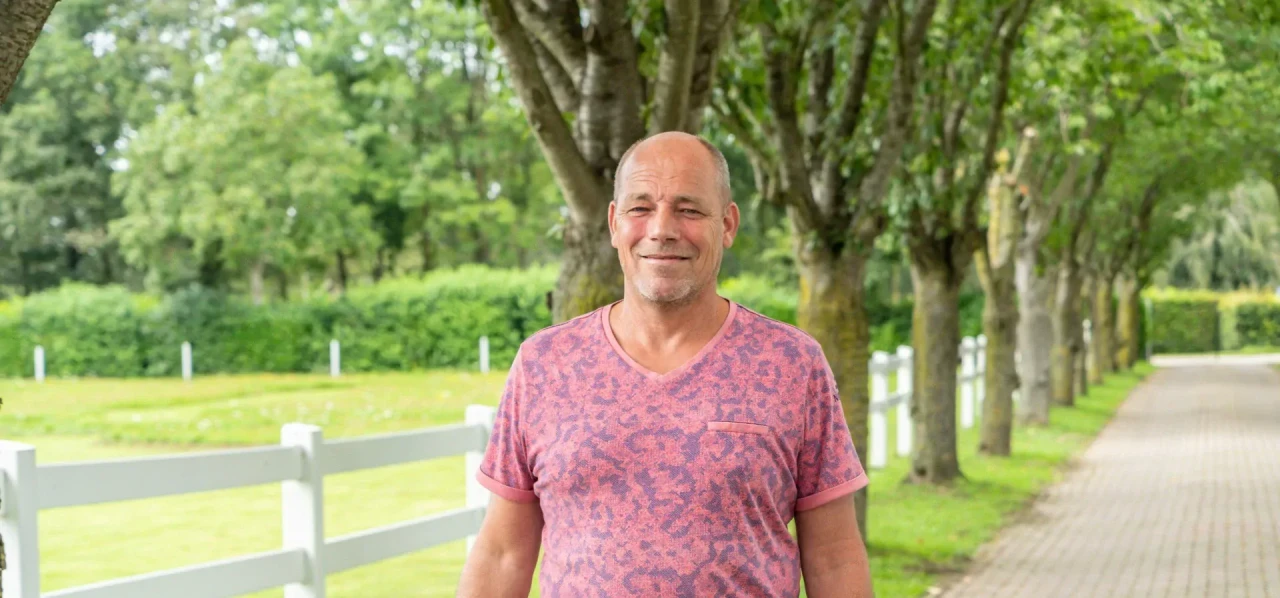When alcohol becomes an addiction, “wanting to drink” turns into “needing to drink”. At that point, it can be very difficult to stop, even if it already causing all sorts of problems. That is because your brain sabotages your good intentions, drawing you back into drinking again and again. Alcohol is also physically addictive, so suddenly giving up drinking can lead to all kinds of withdrawal symptoms, some of which can be serious. So, where do we draw the line between problematic drinking and alcohol addiction? And what exactly defines alcohol addiction? We are here to answer these questions and to help you decide on your next step.
Alcohol addiction

Why stopping on your own is not always easy
Problematic alcohol use often develops gradually. Sometimes, it is preceded by years during which you are still able to keep your drinking under control. But over time, your tolerance increases. That means you need increasingly larger amounts of alcohol to achieve the same effect, which can lead to situations in which you either get drunk more quickly or start binge drinking (more than five drinks at a single occasion). On the other hand, the effects may start becoming less noticeable, so you start increasing the total amount of alcohol you drink.
Alcoholism creates a powerful urge to drink
Your brain is also very good at storing tenacious memories of the positive effects of alcohol. When you find yourself in a situation that reminds you of drinking, you may suddenly feel a powerful urge to drink. This is how you can become addicted to alcohol without even realising it.
Why choose Connection SGGZ addiction care?
- Our treatments are reimbursed by your health insurer
- Short waiting list
- Personalised and specialised treatment
- Working with recovery mentors
- Evidence-based treatment
- Custom aftercare programme
- Excellent family programme
- Rehab centres in the Netherlands and South Africa
Do you need help?
Underlying issues and alcohol addiction
There may be a deeper reason for your alcohol abuse. It could be, in fact, be related to trauma, ADHD, autism or certain personality-related conditions, such as bipolar disorder or borderline personality disorder. The symptoms you experience as a result of such a disorder may seem to fade away for a while when you drink alcohol, or they might cause discomfort in social situations – and that discomfort might disappear once you have had a drink. This kind of self-medication is not always a conscious choice. Sometimes, you may not even realise that there is more going on. Yet these underlying issues can fuel your drinking habits and increase your risk of developing alcoholism.
If you experience mental health problems such as depression, an anxiety disorder or stress, you may also feel more inclined to drink as a way of coping, which is why stopping drinking often requires more than willpower alone.
Do you, or does someone close to you, struggle with alcohol addiction or a drinking problem? Feel free to contact us without any obligation, or ring us on 040-303 5023 for more information or to discuss treatment options.
What is alcohol addiction?
You are considered an alcoholic when you have lost control over your drinking. You can no longer stop drinking – not once you have started, and not even when you had decided in advance not to drink at all. This leads can lead to a variety of problems. Yet, despite those problems, you find yourself drinking again soon. That, too, is a form of losing control: you keep drinking even though it is causing difficulties. Because if you do not, you start to feel unwell as a result of withdrawal symptoms.
Seen from this perspective, alcohol is no different to drugs: it carries the risk of addiction and all the serious consequences for daily life that come with it.
When are you an alcoholic?
Drinking at unusual times of the day can be a sign of alcohol addiction. That is not to say that everyone with an alcohol addiction starts the day with a drink. Addiction reveals itself in many different ways.
If you want to know whether your drinking has become a problem, look at the signs below.
- You cannot stop drinking, even though it causes serious problems.
- You break promises to drink less or not at all – to others and to yourself.
- You drink to escape problems or to avoid painful feelings.
- You experience mental or physical withdrawal symptoms when you stop drinking.
- You often think about alcohol or your next drink.
- You are not honest about how much or how often you drink.
- You avoid situations and social activities where you cannot drink.
- You feel that you need alcohol to function.
- You have blackouts more and more often and forget parts of the evening.
Recognising these signs can help you act in time, before alcohol takes over your life.
Do you recognise some of this in yourself or in someone close to you? And does that worry you? Then please ring us on 040-303 5023. You can also contact us to talk about your habits and for personal advice, without any obligation.
The importance of recognising alcohol abuse early
Alcohol use is socially accepted, whether it involves spirits, cocktails, beer or wine. No one is surprised if you have a hangover once in a while, but that is also the reason why drinking can gradually get out of hand. For that same reason, it is not always easy to recognise a drinking problem at an early stage.
Problematic drinking can develop into alcohol addiction if you ignore certain signs. The earlier you express your concerns, the greater your chances of a full recovery.
I would like advice
“We are also available for questions and advice. Contact us without any obligations.”
Why stopping alcohol addiction is complicated
Alcohol is an addictive substance but despite that, not everyone who drinks becomes dependent. Alcohol addiction develops on three levels: psychological, physical and social. Moreover, normalisation and peer pressure can contribute to the development of problematic drinking, which can eventually result in a serious alcohol use disorder. There are a number of factors that influence your risk of developing an alcohol addiction. We have listed them below.
Genetic factors and alcohol addiction
The reward centre in our brains makes us feel content after a nice meal, doing something we like and exercise. However, this reward system works is inherently less effective in some people. Alcohol – and drugs as well – provide a strong stimulus that those people may respond to more acutely, making them more vulnerable to addictive substances.
A poorly functioning reward system can be something with which you are born. If addiction affects several people in a family, it might be caused by hereditary factors. However, addiction itself weakens the reward system, which is one of the reasons why people can quickly end up in a downward spiral.
Mental resilience and alcoholism
Do you find it difficult to cope with setbacks, stress or depressive feelings? If that is the case, drinking alcohol can become a way of coping with these issues. Under the influence, your problems may seem to fade into the background for a while. At the same time, long-term alcohol use will actually create new problems, and that, too, can draw you into a downward spiral.
Your environment and other social factors
If heavy drinking is considered normal in your social environment – your group of friends, your family, your colleagues even – you find it easier to join them in their drinking. Growing up in an environment where heavy drinking is common can be a risk factor for developing a problem with it yourself later on. Peer pressure can also play a role, especially in environments where the risks of alcohol addiction are underestimated. Another factor is loneliness, as is living in circumstances where future prospects feel limited.
In any case, it is important to know that treating an alcohol problem with the help of specialised care offers a much better chance of lasting recovery. Do not hesitate to contact us, so you cantake the first step towards overcoming your alcohol problem.
Alcohol abuse is both psychological and physical
Alcohol addiction is both psychological and physical, because alcohol causes immediate toxic damage to your body’s cells. As a result, once your body has become dependent on alcohol, it is forced to adapt: that is the only way can it can process the increasingly large amounts of alcohol. This process includes changes that alcohol makes both to your brain and your liver, which starts producing extra enzymes to break the alcohol down. This means that quitting alcohol “cold turkey” – stopping or cutting back suddenly – is not always the best way to stop. In some cases, your body can react very severely.
Do you want to stop drinking? Please feel free to ring us on 040-303 5023. If you drink regularly and you want to cut back, it might be a good idea to ring too; with an alcohol use disorder, your body can also react when it receives less alcohol than it is accustomed to. Together, we can discuss whether professional help with alcohol withdrawal could be a good first step.
I need help
The impact of alcohol misuse and addiction
Alcohol addiction is still sometimes underestimated, even though alcohol is detrimental to your life in many ways. Long-term alcohol misuse can also lead to damage to vulnerable organs, such as your liver, brain, stomach, kidneys and heart. There are other adverse consequences too, such as financial problems, relationship difficulties and mental health issues. By contrast, quitting drinking can bring you a great deal of benefits, and freedom – no longer being dependent on a substance – is perhaps one of the greatest gains of all.
Take the first step towards a new life
Addiction often develops gradually. You may feel ashamed that things have come this far or you may feel guilty. But addiction will not disappear on its own. That is why we see alcohol addiction as a chronic illness of the brain. And just as with other conditions, professional care can help you recover in a sustainable way. Admitting that you have a problem you cannot solve on your own is the first step in your recovery process. It is also the only step you have to take by yourself. From that moment on, we will support you for as long as you need.

"I developed two faces: a happy Edwin and a sometimes sad Edwin. I showed my sad and negative side to almost no one."
Our help with alcohol addiction
It is good to know that we offer different types of treatment. We always tailor our care to your needs. You can come to our rehabilitation centre for alcohol addiction treatment; for outpatient treatment, we can guide you to our partner organisation, CACN.
We are also here for loved ones
Would you like to talk about your alcohol use with one of our healthcare professionals? You are very welcome to contact us. We can also offer personal advice about your own drinking or that of someone close to you, because when you are dealing with someone who is addicted to alcohol, the impact on your life together can be enormous.
So please ring us today on 040-303 5023 or fill out the contact form if you are worried. We can help if you or someone you love is struggling with alcohol addiction.